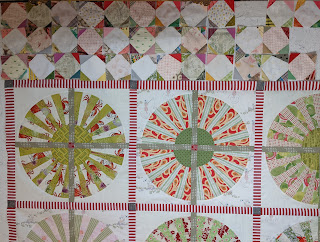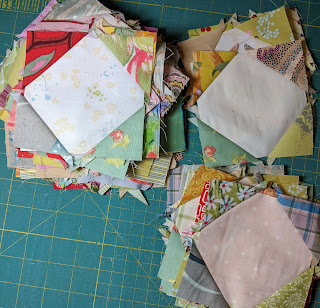Make the best use of what is in your power and take the rest as it comes. If you seek truth, you will not seek victory by dishonorable means; and if you find truth, you will become invincible.
~Epictetus
~Epictetus
Quilting
I used a dark brown to post the stripe at the corners of the wheel blocks. The value is quite a bit darker but the pieces are so small they don't overpower the softness of the rest of the top. Well, soft for me. |
| Center of the wheel quilt sewn |
One that I've wanted to try for a while is the snowball. Again, examples abound in current and vintage work: Sujata's book, Audrey's Scrappy Tulips, Julierose's Autumn Snowballs. A photo of Yoko Saito's glorious taupe Snowballs is here.
Snowballs work as a sixteen-patch as well as a nine-patch. Those definitions just locate the grid a block fits into. Each side divides into four equal parts for a sixteen-patch while a nine-patch divides into three equal parts. Of course, I'm not going to measure my corners. Somewhere between those will work just fine.
The backgrounds are squares of pink, white, cream, tan, and a couple of light yellows. I raided my overflowing scrap bin for corner fabrics and that's where the trouble arose. This first pass included any fabrics that seemed to go but mostly dark values. Too dark. It's overpowering the soft wheels.
 |
| Snowball corners in darker fabrics |
So I removed the darkest by pulling out my trusty Value Finder. In years past I always used it to select fabrics but haven't needed it for a while. This helps me calculate the range of values that will work: 8-10 for snowballs, 5-7 for corners {with perhaps a few 4s.} This second iteration is better but still too bright. The corners need to be quieter still.
 |
| Lighter snowball corners with several brights |
My next battle was removing the brighter brights - even if they are reds - and the blues. I'm not sure why I thought those would work. Looking carefully at all the wheels, the prints include orange, tan, brown, grey, yellow, purple, and pink in addition to red and green. When the border is reduced to these colors in quiet{er} hues within the value range it starts to work. Boy! Lots of hedging in that previous sentence.
 |
| Snowball corners that work with the quilt center |
Finally I can start a little production line {because these babies are very fiddly and time-consuming.} That's what happened the rest of the week and I'm only halfway through. Funny how hard it is for me to use scraps in the corners and actually have them fill the entire corner {and have a bit showing once the seam allowances are in, too.}
 |
| Snowballs sewn and pressed waiting to be trimmed |
In order to keep the various fabrics fairly evenly distributed it seemed best to divide them into four groups - one for each side. I'm sewing each on its own. One is done. These are the snowballs for the second side. Slower than molasses in January... and it's May.
 |
| Snowball borders in progress |
Masks and Gowns
My final thirteen masks are made and shared with neighbors; 263 in all... I think. No more lining fabric right now. But work on isolation gowns continues. Six this week for a running total of 19. As I wrote before, they a delivered to a variety of sites: hospitals, social workers doing home health checks. For more information, check Sewing 4 Good.Enjoy the day, Ann